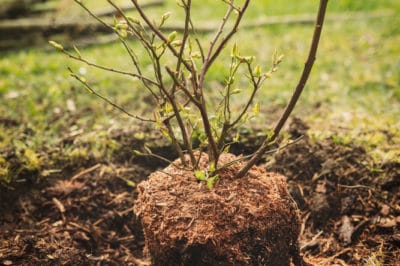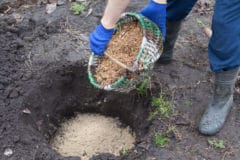Three Soil Requirements
The healthiest blueberry bushes grow in soil that meets three conditions. The first requirement for blueberries is acidic soil. The second soil condition needed is organic matter and the third is good drainage. If your soil doesn’t meet the conditions needed for growing blueberries, don’t worry. You can revitalize your soil to meet the needs of blueberries.
- Soil Acidity –If you’re not sure about your soil’s pH, you can use a home soil test kit or bring a soil sample to a local nursery for testing. If your soil tests higher than 5.6 pH, then you’ll need to add powdered sulfur to the soil to lower the pH. If your soil tests below 4.5, then it is sour. To raise the acidity, add limestone to your soil.
- Organic Matter – Adding organic mulch to your soil helps keep the shallow roots of blueberry bushes moist and boosts soil acidity. A few examples of organic matter you can use to supplement your soil are compost, dried leaves, pine needles, peat moss, cypress, straw and pine bark.
- Well-drained Soil – Blueberries need well-drained soil to grow strong canes and foliage. One method of testing your soil drainage is to dig a hole about one foot deep. Fill the hole with water, timing how long it takes the water to drain out of the hole. If the water drains within one and one-half hours, then your drainage is okay. If it takes longer than that to drain completely, consider planting your blueberry bushes on mounds for better drainage.
Preparing Soil before Blueberry Season
Another method of increasing soil acidity and organic matter is to plant green manure crops before blueberry season arrives. Planting a crop of buckwheat in the early summer of the previous year and then turning it into the soil in late summer will give your soil the nutrients it needs for planting blueberries in the spring. After harvesting your blueberries, plant a cover crop of winter rye to reduce soil and nutrient loss.












